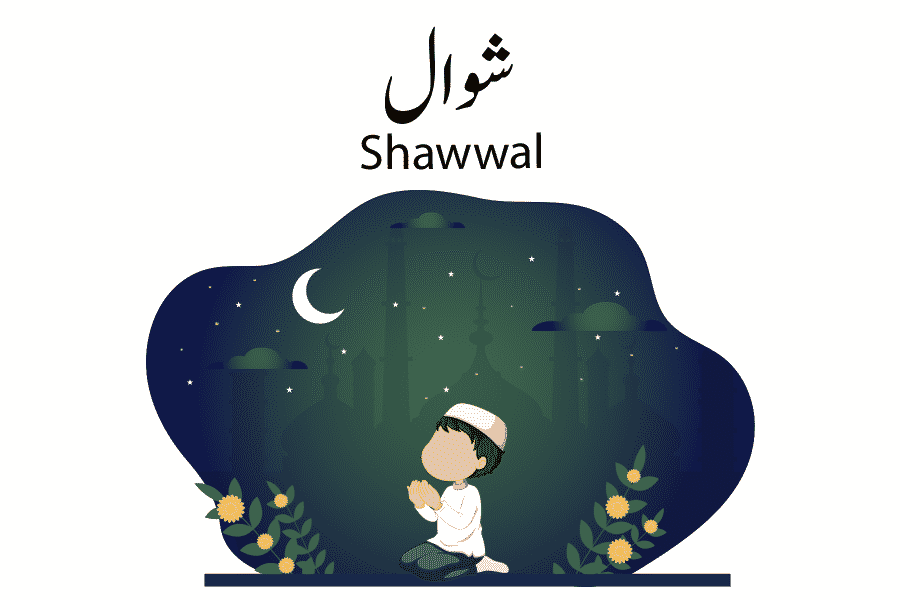The month of Ramadan has ended, and most of us are in grief for it being apart. But Ramadan has left us with another blessed month of Shawwal. But there are hadiths about fasting in this month. Well, one cannot compare the descendant month of Shawwal with Ramadan in its glory, but still, it has its importance and dignity. One of the exemplary aspects of Shawal is that Allah Almighty has chosen it for the celebration of “Eid-ul-Fitr.” Yet another speciality of this month is the opportunity of fasting six days of Shawal.
Hadith on the Fasting in the Month of Shawwal
The Messenger of Allah (peace and blessings be upon him) said,
“Fasting Ramadan and following it with six days from Shawal is like continual fasting.” [Muslim, on the authority of Abu Ayyub (Allah be pleased with him)]
Fasting in the month of Shawal will be multiplied ten times as Ramadan is like fasting 300 days, and fasting six days of Shawal is like fasting 60 days. The Prophet (Allah bless him and give him peace) himself stated this explicitly:
“Fasting Ramadan is like fasting ten months, and fasting six days [of Shawwal] is like fasting two months. That is like fasting a full year.” [Ahmad & Nasa’i]
Al-Nawawi says:
“Scholars have explained that it is like observing a year of fasting because the reward of one’s good deeds are multiplied 10-fold. Therefore fasting the month of Ramadan is like fasting for ten months, and fasting six days in the month of Shawwal is like fasting for two months.”
(Sahih Muslim)
Is it Sunnah or obligatory to fast in Shawwal?
Hadith about the fasting in the month of Shawal has have made us clear that these fasts have many rewards. There are often found various confusions about it, for example:
Is it obligatory? Can one combine six fasts of Shawal with makeup fasts of Ramadan? Should fasts in Shawwal be consecutive?
First of all! These facts are not obligatory ( Fard); they are Sunnah! It is good to fast in Shawwal, as it would increase your reward and bring the pleasure of ALLAH. But it is not compulsory. Secondly, The Shafi`is and Hanbalis state that making the six fasts consecutive; is not preferable to start Fast from the 2nd of Shawwal and keep fasting up to the 7th of Shawwal. However, if they held on other days, it is hoped that .it may also fulfil the requirement of the above Hadith.
Now comes the matter of combining the fasts of Shawwal with the make-up fasts of Ramadan. Making Up missed Ramadhan fasts (Qadha) and the six fasts of this month, one should principally make an intention of Qadha. After that, as a ‘secondary’ purpose, one may also keep in mind that it is the month of Shawwal. By doing so, it is hoped from the mercy of Allah that along with the missed fasts being made-up, one will receive the reward of fasting. But, the primary and predominant intention must be to make up for the missed fasts.
However, one should make up for the missed fasts separately from fasting the six days of Shawwal since some scholars believe that one does not receive the reward of optional (Nafl) fasting when combined with makeup (Qadha) fasts.
Virtues of fasting for six days
1. Fasting in Shawwal behind Ramadan will be rewarded for fasting throughout the year.
2. On the Day of Judgment, our voluntary acts of worship will compensate for the shortcomings in carrying out our duties. Most of us have imperfections in keeping our Ramadan fasts, and we need something to cover up for those deficiencies.
3. Our return to the practice of fasting right after Ramadan symbolises that we have accepted our Ramadan fasts. When Allah accepts our worship, He blesses us to encounter further acts of righteousness. Therefore, following one good deed with others like it is a sign that Allah had accepted the first deed. By contrast, if a sinful one follows a person’s good deed, it is an indication that they might not have accepted the first good deed.
4. There is no blessing greater than forgiveness for one’s sins, and we know that fast of Ramadan is recompensed with forgiveness of one’s previous sins.
















